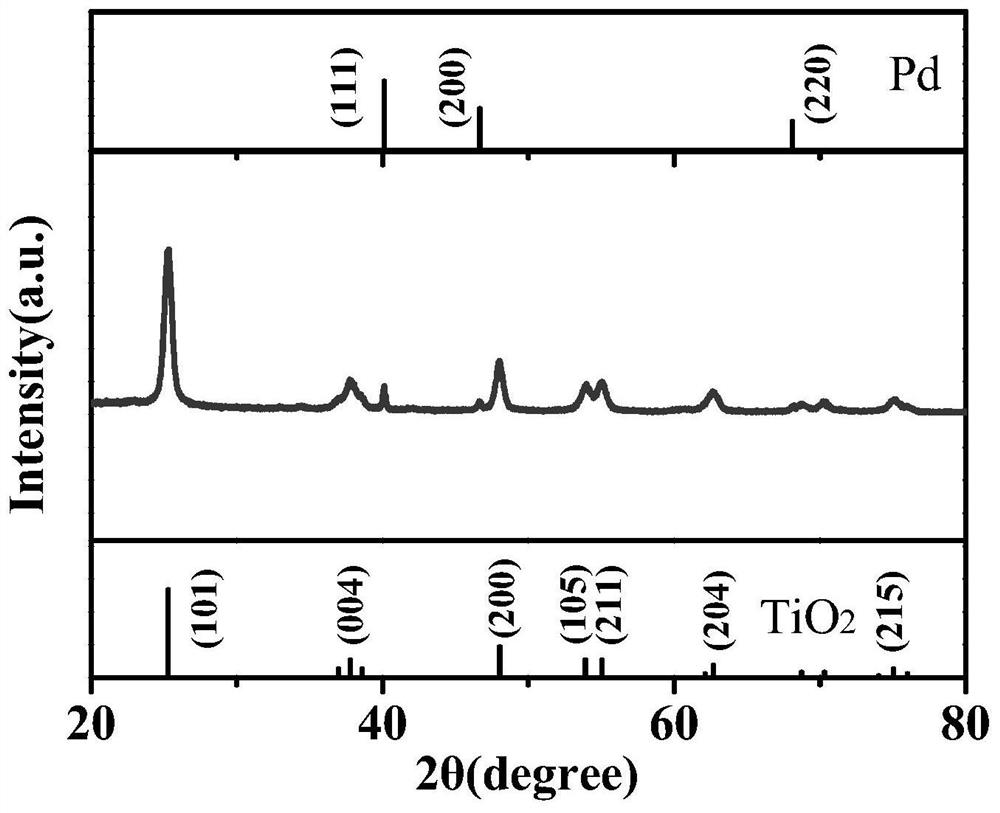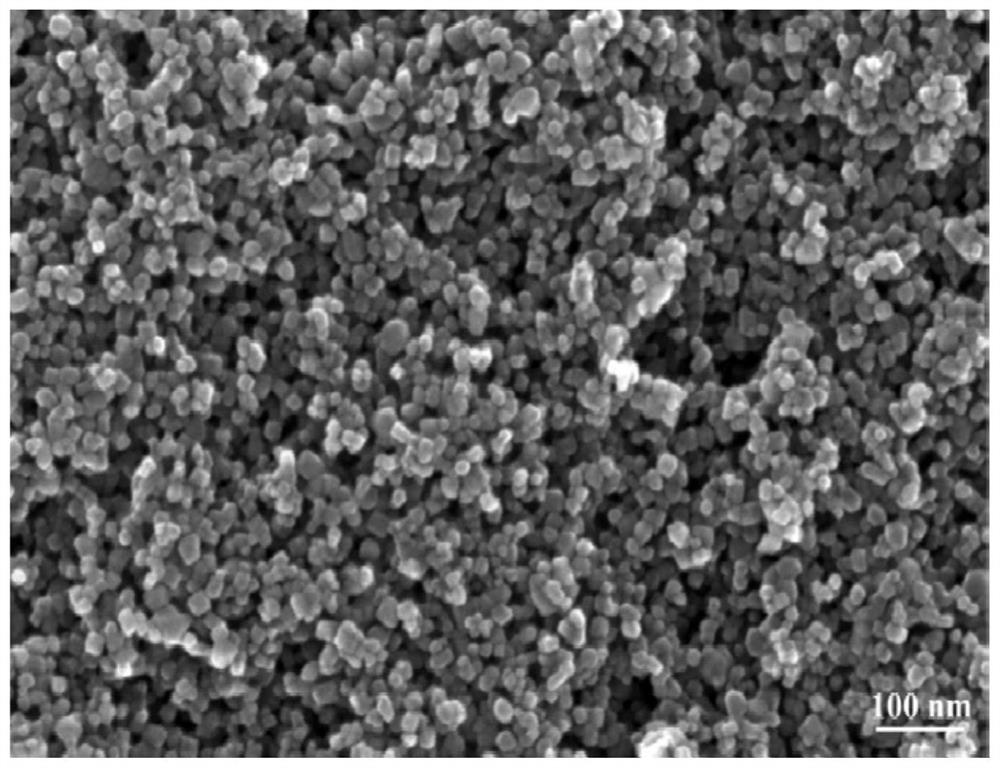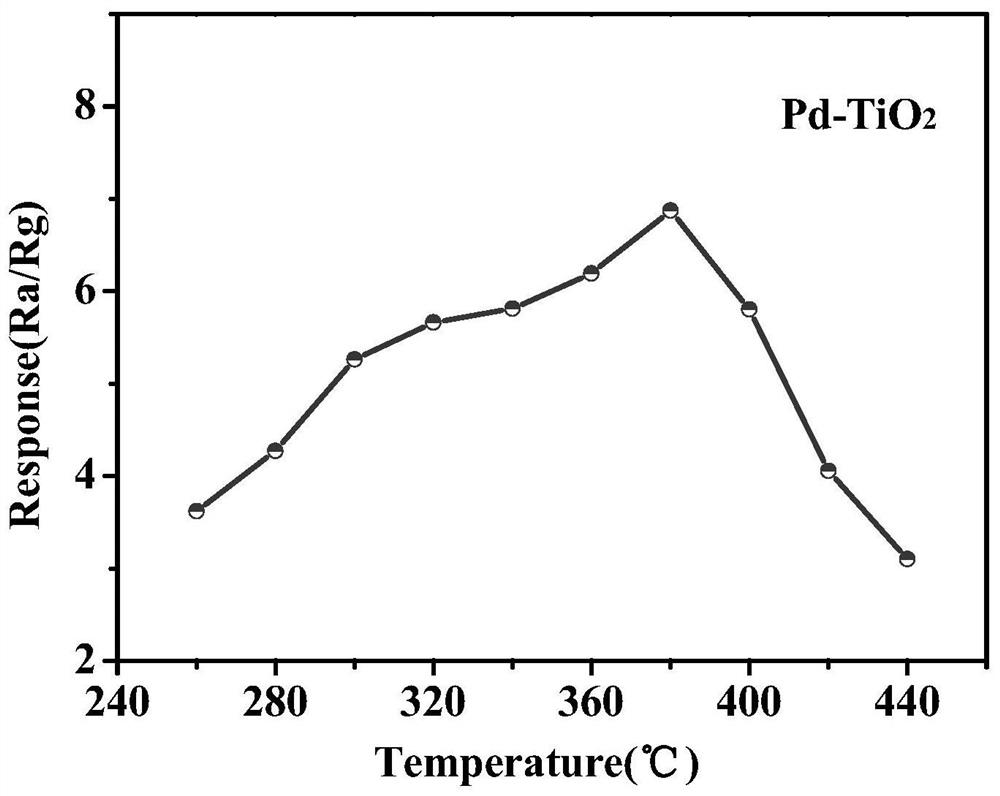A Rapid Response PD-tio 2 Preparation method of nanoparticle hydrogen sensitive material
A nano-particle, fast-response technology, applied in analytical materials, chemical instruments and methods, alkali metal oxides/hydroxides, etc., can solve the problem of difficult safe storage and transportation of hydrogen, inability to be sensed by the human body, fast diffusion speed, etc. problems, to achieve the effect of wide range of hydrogen concentration, fast response and recovery, and small size
- Summary
- Abstract
- Description
- Claims
- Application Information
AI Technical Summary
Problems solved by technology
Method used
Image
Examples
Embodiment 1
[0028] A Fast Response Pd-TiO 2 A method for preparing a nanoparticle hydrogen-sensitive material, comprising the following steps:
[0029] a. Add concentrated hydrochloric acid to deionized water and stir evenly to prepare a 20mM dilute hydrochloric acid solution;
[0030] B, measure the 20mM dilute hydrochloric acid solution of 5ml, add 0.017g palladium chloride, stir to obtain palladium chloride solution;
[0031] c. Slowly add 5ml of tetra-n-butyl titanate and 0.5ml of hydrofluoric acid solution while stirring, and stir until uniform;
[0032] d. Pour the above solution into the lining of the polytetrafluoroethylene reactor, put it into the stainless steel shell, and heat it with water at 180°C for 24h;
[0033] e. After the water heating, let the reactor cool down naturally, centrifuge the obtained precipitate, filter it with suction, and dry it at 60°C for 12 hours to obtain Pd-TiO 2 Nanoparticle hydrogen sensitive materials;
[0034] f. Coating the obtained composit...
Embodiment 2
[0036] A Fast Response Pd-TiO 2 A method for preparing a hydrogen-sensitive material of nanoparticles, comprising the following steps:
[0037] a. Add a certain volume of concentrated hydrochloric acid to a certain volume of deionized water and stir evenly to prepare a 20mM dilute hydrochloric acid solution;
[0038] B, measure the 20mM dilute hydrochloric acid solution of 4ml, add 0.0136g palladium chloride, stir to obtain palladium chloride solution;
[0039] c. Slowly add 5ml of tetra-n-butyl titanate and 0.4ml of hydrofluoric acid solution while stirring, and stir until uniform;
[0040] d. Pour the above solution into the lining of the polytetrafluoroethylene reactor, put it into the stainless steel shell, and heat it with water at 180°C for 24h;
[0041] e. After the water heating, let the reactor cool down naturally, centrifuge the obtained precipitate, filter it with suction, and dry it at 60°C for 12 hours to obtain Pd-TiO 2 Nanoparticle hydrogen sensitive material...
Embodiment 3
[0044] A Fast Response Pd-TiO 2 A method for preparing a hydrogen-sensitive material of nanoparticles, comprising the following steps:
[0045] a. Add a certain volume of concentrated hydrochloric acid to a certain volume of deionized water and stir evenly to prepare a 20mM dilute hydrochloric acid solution;
[0046] B, measure the 20mM dilute hydrochloric acid solution of 6ml, add 0.017g palladium chloride, stir to obtain palladium chloride solution;
[0047] c. Slowly add 5ml of tetra-n-butyl titanate and 0.6ml of hydrofluoric acid solution while stirring, and stir until uniform;
[0048] d. Pour the above solution into the lining of the polytetrafluoroethylene reactor, put it into the stainless steel shell, and heat it with water at 180°C for 24h;
[0049] e. After the water heating, let the reactor cool down naturally, centrifuge the obtained precipitate, filter it with suction, and dry it at 60°C for 12 hours to obtain Pd-TiO 2 Nanoparticle hydrogen sensitive material;...
PUM
| Property | Measurement | Unit |
|---|---|---|
| size | aaaaa | aaaaa |
Abstract
Description
Claims
Application Information
 Login to View More
Login to View More - R&D
- Intellectual Property
- Life Sciences
- Materials
- Tech Scout
- Unparalleled Data Quality
- Higher Quality Content
- 60% Fewer Hallucinations
Browse by: Latest US Patents, China's latest patents, Technical Efficacy Thesaurus, Application Domain, Technology Topic, Popular Technical Reports.
© 2025 PatSnap. All rights reserved.Legal|Privacy policy|Modern Slavery Act Transparency Statement|Sitemap|About US| Contact US: help@patsnap.com



